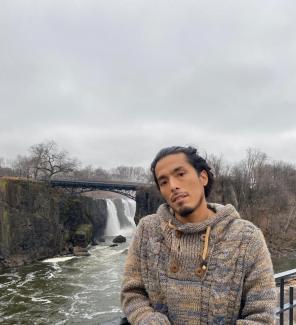
Graduate Student
Areas of Interest: Postcolonial/ Decolonial Theory, Politics of Autonomy, Critical Indigenous Studies, Militant Research, Networks and Geographies of Power and Statecraft, Extractivism.
Education:
B.A. in Political Science - Rutgers University (2007 - 2012)
M.A. in International Affairs - City University of New York - Brooklyn College (2014 - 2016)
Ph.D. Candidate - expected date of graduation: June 2023
Bio:
Being a multi-ethnic, first-gen, son of immigrants to the US, George has embodied the global in many ways. Throughout his life, George has traversed several scales of politics in his work as an activist and growing scholar. George has taken part in or organized with several social movements since high school around the New York metro area, connecting with scholars and activists across the globe. From OCCUPY to #BlackLivesMatter and immigrant rights, his work on the ground has influenced his global perspective and vice versa. The solidarity networks George has built over the years has taken him abroad to participate at international gatherings and take part in social movement delegations. Most notably, George took part in the World Social Forum in Montreal and was part of the Alliance for Global Justice delegation with Dr. Jill Stein at the People’s Climate summit in Lima, Peru, where he conducted “undisciplined” research on extractivist mining in the highlands of the Peruvian Andes. Taking pedagogy seriously, George's scholarly research and social activism come to bear in his teaching, serving as a facilitator for deeply engaged and relational praxis of teaching.
Research:
George’s dissertation investigated contemporary anti-mining resistance in Espinar, Peru, within the ontological turn in the social sciences, most recently taken up by decolonial studies by recognizing that difference extends far beyond superficial elements of culture towards new ways of being. This work explores how residents in this southern Peruvian rural mining town develop oppositional political identities based on Andean cosmovisions—historical indigenous relationalities predicated upon human and non-human filiations—to confront extractivist copper mining operations in the nearby mines of Antapaccay and Coroccohuayco. George’s work drew upon interdisciplinary and transdisciplinanry methods for “controlling equivocation,” which Brazilian anthropologist Eduardo Viveiros de Castro defines as the mitigation of distinct ways of knowing born of indigenous-centered paradigms outside of nation-state models. George made the central claim that the politics of refusal against mining in Espinar emerge from an Andean indigenous understanding of historical ontological difference, which also is connected to critical global undercurrents of indigenous resurgence. These politics of being ultimately reconfigure contemporary models of indigeneity in the region as always already antithetical, but in empowering ways indigenous people determine.
George's broader research is situated at the confluence of critical frameworks and hemispheric hermeneutics in Black and Native studies, which explore the complexities and nuances of indigeneity and Blackness to achieve a much-needed dialogue across historically interrelated ontologies. George is interested in questions of epistemic formations, the imposition of state processes, and critical praxis, particularly as these are focused on the problematic of colonization and state violence. His work speaks to Cultural Studies, Latin American Studies and Critical Global Studies.
In the Fall of 2023, George will be joining the University of Pennsylvania as a Mellon Postdoctoral Fellow in the Interdisciplinary Research Project, “Dispossessions in the Americas: The Extraction of Bodies, Land, and Heritage from La Conquista to the Present.”
Awards
Graduate Student Association Excellence in Teaching Award, University of California, Santa Barbara. 2020-2021.
Sixteenth Global Studies Conference - Emerging Scholar Award. 2023.
Early Career Researcher Paper Prize, Runner-up. Colonial, Postcolonial and Decolonial Working Group. British International Studies Association. 2023.
Publications:
“Book Review: Tiffany Lethabo King, The Black Shoals: Offshore Formations of Black and Native Studies." AlterNative (2020): 277-278.
“Book Review: Inventing Latinos: A new story of American racism.” Lat Stud (2022). https://doi.org/10.1057/
“Theorizing Peru Profundo: Postcolonial Geographies and Technologies of Order in the Hinterland” Under External Review. Review of International Studies.
Other Worlds and Societies in Movement: Debating Anti-Colonialism and Transition in Latin America. [Translation] AK Press, forthcoming.
Courses:
University Teaching Experience:
2017-22: Teaching Assistant, Departments of Global Studies, History, Asian American Studies, Black Studies University of California, Santa Barbara.
2019, 2021-2023: Visiting Assistant Professor, Dept of Critical Global Studies, Pitzer College
Courses Taught:
- Introduction to Critical Theory
- Social and Political Movements of the Third World
- Resistance to Monoculture
- Power and Social Change
- Interdisciplinary Knowledge & Global Justice
- Whose Justice?